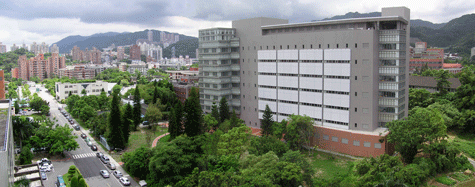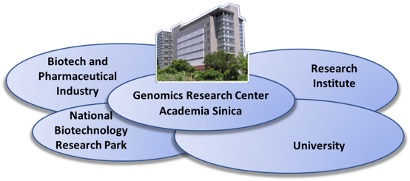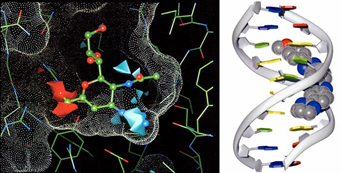
Guided by the profound vision of former President Dr. Yuan-Tseh Lee and the founding Director Dr. Chi-Huey Wong, the Genomics Research Center (GRC) was established in 2003. After Dr. Wong was elected the President of Academia Sinica, Dr. Chung-Hsuan Chen had assumed the directorship and continued to build a strong research team from 2007 till 2016. Starting from July 2016, Dr. Shang-Cheng Hung has served as the Director till July 2022. Currently, Dr. Chih-Hao Lee is appointed as the Director of GRC. The Center aims to translate its scientific discoveries from the research of genomics, proteomics, and glycomics to disease therapeutics and biomedical devices for precision healthcare and medicine.
Composed of both senior scientists as well as energetic and talented junior researchers, GRC research team has expanded to more than 30 full-time faculty. Their specialties cover a broad range of fields from physics, chemistry, engineering, computation, biology, to medicine. Among the faculty, there is an excellent team of specialists to support technology development and to increase innovation capacity. These two unique features enable GRC to facilitate advanced interdisciplinary research. In addition to these research staff, two other tremendous talent pools, Academic Advisory Committee (AAC) and joint research fellows, complement the Center and its research projects perfectly. All AAC members are renowned scientists in the world who advise GRC on both research and strategic planning regularly. Joint research fellows from major research institutes in Taiwan are also a very valuable asset for the projects involving interdisciplinary effort.
To foster young and promising students to join the field of advanced research, GRC currently has joint graduate programs with several top universities . GRC faculty also participate in the Taiwan International Graduate Program (TIGP) and other domestic degree programs collaborated between Academia Sinica and local universities. The broad scope of research interests within GRC gives students, research assistants, and postdoctoral fellows a great opportunity for training in the most cutting-edge fields. GRC will continue cultivating first-class talents to master in the modern disciplines and take the lead in their profession.
In the effort to screen new drug leads for various diseases, GRC has collected a chemical library of more than 2.5 million compounds and built the first high throughput drug screening facility in Asia. GRC has also established critical facilities for cell biology and biomedical technology development, including novel mass spectrometry facility, NMR and X-ray facility for structure determination, microarray, peptide synthesis, high throughput genome sequencer and glycan analysis platforms for genomic research, and antibody development and optimization core, the animal laboratory, and Biosafety Level 3 Laboratory for pathological analysis and drug lead development. These facilities can significantly advance frontier biotechnology development and drug discovery. It aspires to strengthen its multidisciplinary research, accelerate the transfer of the novel research findings into clinical practice, promote academia-industry collaboration, and speed up the development of Taiwan’s biotechnology industry.
The major focus of GRC’s research is on the translational research of the major diseases (including cancer, infectious diseases, and neurodegenerative diseases) and regenerative medicine. Through novel discoveries, powerful diagnosis tools and new therapeutic strategies are expected to be developed. Increased efforts will be placed on the pursuit of fundamental scientific advances through interdisciplinary programs, and the extension of basic discoveries to translational research. Therefore, it organizes 3 research Divisions: (1) Chemical Biology Division to develop new tools and molecules to target cancer and infectious diseases, (2) Medical Biology Division to develop translational medicine for cancer biology, stem cell biology, immunobiology and epidemiology, and (3) Physical and Computational Genomics Division to develop data analysis for drug prediction, and novel biomedical technology development. In addition to these Divisions, GRC had also established the Biotechnology Incubation Center (BIC) for pursuing technology transfer to convert important discoveries into commercial opportunities. By the end of 2020, BIC had recruited 16 highly respectable biotechnology companies or startups that licensed technologies from Academia Sinica. The estimated total market value of these biotechnology companies is nearly 240 billion and expected to grow rapidly. Seven of these 16 companies have successfully commercialized proprietary products and hence become independent to build up their own manufacturing facilities. Following the policy of Academia Sinica, BIC has been merged with BioHub Taiwan, National Biotechnology Research Park (NBRP) to continue to provide holistic service and create a productive ecosystem for Taiwan bio-industry in April 2021.

Some of the scientific pursuits in GRC with great potential to be among the world-leading research include new drug design based on structure study of membrane protein, carbohydrate chemistry, and structural biology, the relationship of molecular biology modulation and disease, high throughput technology for drug discovery, infectious disease and vaccine development, immunotherapy, cancer stem cell, epidemiology, evolutionary bioinformatics, biological mass spectrometer development, and fast biomarker search. It continuously strives to make GRC a place that inspires as well as fulfills innovative ideas. Up to 2020, GRC members have published more than 2,700 papers and have filed over 660 patent applications, and signed more than 45 technology transfers, which earned more than 1.5 billion contract/authorization fee as well as 60 million tech stocks for Academia Sinica. In addition, the technology platforms developed in GRC have been successfully applied to fight against the COVID-19 pandemic and transferred to either domestic or international biopharmaceutical companies (including screening tests, the potential anti-COVID-19 compounds, etc.) to quickly respond to this life-threatening disease and open up new opportunities for international cooperation. Its research performance has already matched or been very competitive to several international glycomics-related research institutes with high reputations.

GRC will continue to pursue fundamental scientific research and translate the discoveries to disease therapeutics through interdisciplinary approaches. Its future perspective is to play a more crucial role in the pharmaceutical and biomedical device industry in Taiwan.